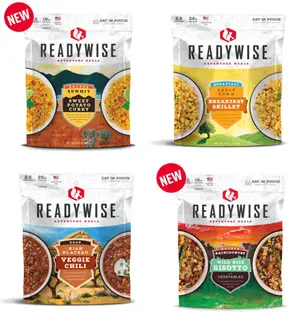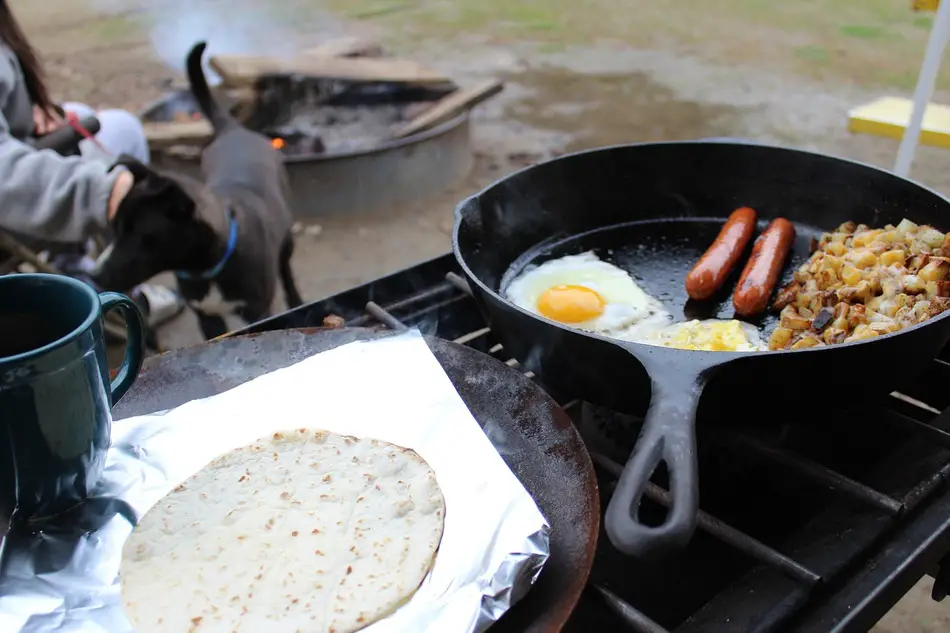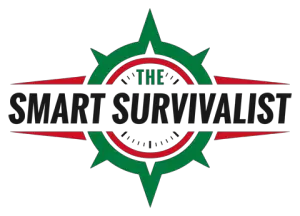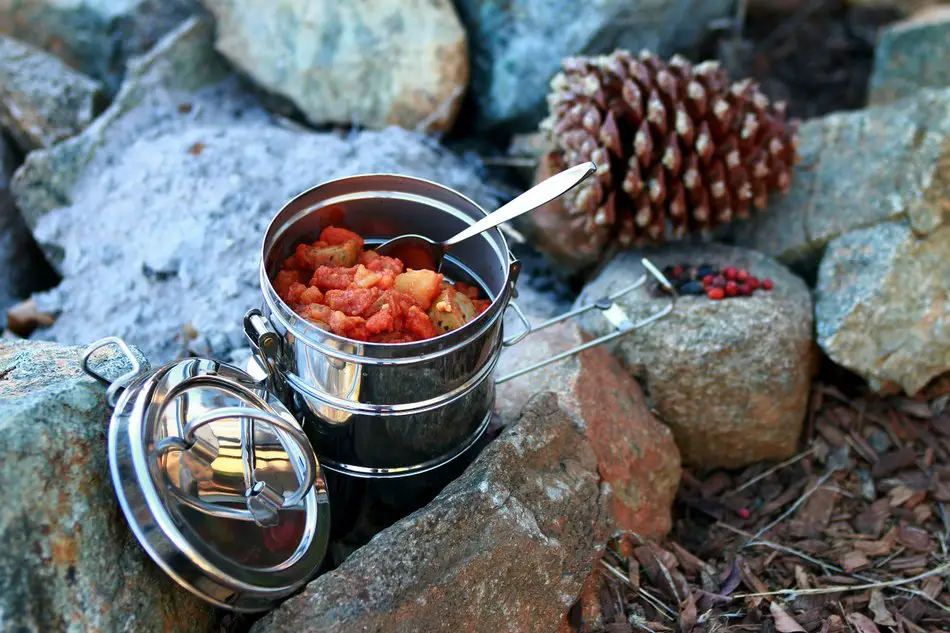When I’m preparing for camping in the wild for a few days, I always make sure that I have packed all the essential food. “Living off the land” by hunting and gathering is not as easy as it sounds, especially if you’re simply a recreational camper. Which is why you and your group need to have enough diverse food to sustain you for days.
So what food should you pack for camping? While it depends on equipment and how long you plan to camp, here are the best options:
- Bread
- Wraps and pitas
- Vegetables
- Oil or butter
- Salt, pepper, herbs and spices
- Coffee or tea
- Eggs
- Beef
- Chicken or turkey
- Bacon
- Cheese
- Potatoes
- Fruit
- Trail mix
- Marshmallows
But, of course, a short answer shouldn’t satisfy you. There are a few more details that you need to know and some factors that you should consider. Also, I have a few useful tips besides the food list. Let us read on.
All the Food That You Need to Pack for Camping
I understand that personal taste is something to take into consideration. And as I mentioned earlier, how long you intend to camp and what equipment you carry are also factors that can influence your food list. Which is why I’ve written down all the best options available, and it is up to you to choose what you’ll pack for camping.
- Bread: the foundation for every sandwich. Sliced bread is, of course, not the only option. You can have some delicious fun by dipping chunks of bread in stew or soup.
- Wraps and pitas: instead of bringing a lot of plates, these tasty types of bread can neatly pack your meal together. You can make a burrito or a similar meal by putting meats, vegetables and other ingredients inside. A whole dinner with no plates and utensils to wash.
- Vegetables: a healthy companion of every meal, or even the main course if you are a vegetarian. Veggies are full with goodies, with all the awesome vitamins and elements that your body will be grateful for. Make a salad, make a tasty vegetable soup, chop them to stuff in a tortilla, the possibilities are endless!
- Oil or butter: you can bring either one or both. Spread them on your pan to prevent food from sticking to it and to add a special taste to the meal. Olive oil can be also used as an excellent salad seasoning.
- Salt, pepper, herbs and spices: if you don’t want a boring and bland meal, you need to pack some of these. Herbs and spices don’t weigh a lot, but they add so much flavor to the food you’ll be preparing at the campsite.
- Coffee or tea: we all need something strong to start our day with. Making coffee over the campfire is an unforgettable experience. They are available in small, easily carried packets, just make sure you bring enough for the whole group.
- Eggs: these little protein packages are easily cooked and can serve as a main course or an addition to one. They can be boiled or fried in a matter of minutes.
- Beef: it can be used in several ways to provide you with the necessary protein. Make a chili, taco salad, sprinkle ground beef over your spaghetti or even make a burger if you have the right equipment. And obviously there is jerky (dried beef), a good companion of almost every camper.
- Chicken or turkey: another easily prepared meat, a tasty main course of every campsite dinner. Grill it on a skewer, put in a tortilla, throw into a soup – you name it! The result is a tasty and satisfying meal that every hiker would enjoy.
- Bacon: this yummy companion to many people’s breakfast is a welcome addition to your food list. You can fry it in a pan over the coals, stuff in your sandwich or crumble over your salad. Pre-cooked bacon is also an option if you don’t want to carry a pan.
- Cheese: another excellent and universal addition to any daily meal! You can add to your sandwiches, pasta, tacos, hamburger, and so on. You can even prepare a fondue for everyone to sit around it and enjoy as the sun goes down.
- Potatoes: an honorary mention goes to the potato, the classic camping food. Baked potato is a famous meal that no camper would refuse. It goes with every other possible food, be it cheese, bacons, onions, yogurt, bacon, and so on. Potatoes can be cooked in a huge variety of ways: mashed, boiled, fried, whatever you desire at the moment.
- Fruit: AKA the nature’s candy. Any fruit can provide you with the essential vitamins and serve as a great, guilt-free dessert or an intriguing addition to a veggie salad.
- Trail mix: this snack needs no preparation and one of the most favorite hiking foods. A typical trail mix combines various nuts, dried fruit, granola, and sometimes chocolate. It’s easy to carry and full of energetic nutrients.
- Marshmallows: just like the potato, marshmallows are a classic campfire food. You can consume the marshmallows as is, but you definitely should try putting them on the stick and holding over the fire. This is the one camping experience that you must have. Another suggestion is adding marshmallows to cocoa, for that unforgettable taste.
 If this sounds like a lot of tiresome shopping to do, I have a quick, affordable – and tasty – solution for you. ReadyWise Outdoor Food has you covered! They offer a huge selection of delicious and nutritious meals that you can prepare on the go.
If this sounds like a lot of tiresome shopping to do, I have a quick, affordable – and tasty – solution for you. ReadyWise Outdoor Food has you covered! They offer a huge selection of delicious and nutritious meals that you can prepare on the go.
No mess, no need to carry all the ingredients – their packs and adventure bags have everything that you need. Sweet potato curry, four bean and vegetable soup, cookie dough snacks, spicy noodles, teriyaki chicken & rice, and so much more! So click here to browse their selection, and have a healthy and yummy camping trip!
Need a few recipes for the camping food mentioned in this post? Here is a video that will help you:
Camping Meals That Don’t Require Cooking
If you’re hiking from dawn to dusk, you will naturally need food to replenish your energies. However, you might be also too tired to cook. So just sit by the campfire, but don’t put any pots over it. I prepared another list of food that you can pack and eat without spending time and energy on cooking.
- For a good breakfast, consider a nice helping of granola. The cereal needs no cooking, and you can mix it with dried fruit, seeds and nuts. Add milk and voila, a whole breakfast. For a hot drink, you can make coffee or tea from packets, they only require boiling some water, which just takes a few moments.
- For a delicious and nutritious lunch, try tuna or any other canned/packed fish with crackers. Another suggestion is a sandwich made of a crispy bread with sliced tomatoes, avocado and mozzarella cheese. You can also spread peanut butter on a slice of bread and top it with sliced banana. Any of these will give you the additional energy that you need, even if you’re walking and hiking at this very moment.
- A satisfying dinner can be made using any prepackaged and freeze-dried food that can be purchased in a grocery store. These can be pastas, soups, chicken, and much more. They don’t need to be refrigerated or even mixed with water. If you have a cooler, then your possibilities are even wider. You can mix greens and vegetables with canned peas and olive oil. Fill a wrap or a pita bread with this salad, and you have a great low-effort dinner to eat by your tent.
- Sometimes you just need a snack, not a whole meal. Something to keep you moving; something to consume on the go. Trail mix, energy bars, dried fruit, jerky – any of these can give you additional boost of energy, and they don’t require special storage and cooking. If you have a cooler, keep there some fresh fruits and vegetables for additional vitamin intake. You definitely deserve some low-fat, nutritious desert after hiking for several hours.
If you decide to cook after all, here is a complete guide on cooking while camping.

What Food-Storing Equipment Should I Pack for Camping?
This depends on the type of the food that you intend to bring. Canned, non-perishable, vacuum-sealed food requires just being stored in a shade and can literally last for years. On the other hand, dairy products, meat, even vegetable need to be constantly cooled, or they will spoil in a matter of days or less. Possible solutions are:
- Small portable refrigerators
- Coolers
- Ice packs
You can find quality refrigerators and coolers online, and they will serve you for a long time. If you didn’t pack them, consider camping for a shorter period of time.
Here is a helpful video on efficiently storing your camping food in a cooler:
Related Questions
How do you reheat food when camping? First of all, I’d advise you to store leftovers by wrapping them well in foil and then place in the cooler. When the fire is done burning, place the wrapped food on the smoldering coals to reheat it. Bon appetite!
How do you protect food while camping? An excellent solution that protects your food from hungry animals is a bear canister that can be purchased online. Store all your food inside it and put on a flat ground, downwind and at least a hundred feet from the campsite.
Can I keep food in my car while camping? Yes, and here are a few tips. It should not be visible, hide it under a seat or a blanket, and preferably in a cooler. Ensure that the windows are closed entirely and the car is locked. If you have a pickup truck, it is not advisable at all to keep in the bed or strap anywhere outside the car’s cabin.


